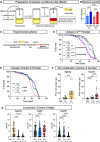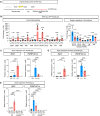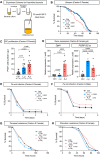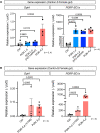Recognition of commensal bacterial peptidoglycans defines Drosophila gut homeostasis and lifespan
- PMID: 37023169
- PMCID: PMC10112789
- DOI: 10.1371/journal.pgen.1010709
Recognition of commensal bacterial peptidoglycans defines Drosophila gut homeostasis and lifespan
Abstract
Commensal microbes in animals have a profound impact on tissue homeostasis, stress resistance, and ageing. We previously showed in Drosophila melanogaster that Acetobacter persici is a member of the gut microbiota that promotes ageing and shortens fly lifespan. However, the molecular mechanism by which this specific bacterial species changes lifespan and physiology remains unclear. The difficulty in studying longevity using gnotobiotic flies is the high risk of contamination during ageing. To overcome this technical challenge, we used a bacteria-conditioned diet enriched with bacterial products and cell wall components. Here, we demonstrate that an A. persici-conditioned diet shortens lifespan and increases intestinal stem cell (ISC) proliferation. Feeding adult flies a diet conditioned with A. persici, but not with Lactiplantibacillus plantarum, can decrease lifespan but increase resistance to paraquat or oral infection of Pseudomonas entomophila, indicating that the bacterium alters the trade-off between lifespan and host defence. A transcriptomic analysis using fly intestine revealed that A. persici preferably induces antimicrobial peptides (AMPs), while L. plantarum upregulates amidase peptidoglycan recognition proteins (PGRPs). The specific induction of these Imd target genes by peptidoglycans from two bacterial species is due to the stimulation of the receptor PGRP-LC in the anterior midgut for AMPs or PGRP-LE from the posterior midgut for amidase PGRPs. Heat-killed A. persici also shortens lifespan and increases ISC proliferation via PGRP-LC, but it is not sufficient to alter the stress resistance. Our study emphasizes the significance of peptidoglycan specificity in determining the gut bacterial impact on healthspan. It also unveils the postbiotic effect of specific gut bacterial species, which turns flies into a "live fast, die young" lifestyle.
Copyright: © 2023 Onuma et al. This is an open access article distributed under the terms of the Creative Commons Attribution License, which permits unrestricted use, distribution, and reproduction in any medium, provided the original author and source are credited.
Conflict of interest statement
The authors declare no competing interests.
Figures









Similar articles
-
RNA Interference Directed against the Transglutaminase Gene Triggers Dysbiosis of Gut Microbiota in Drosophila.J Biol Chem. 2016 Nov 25;291(48):25077-25087. doi: 10.1074/jbc.M116.761791. Epub 2016 Oct 19. J Biol Chem. 2016. PMID: 27760824 Free PMC article.
-
Total ginsenosides extend healthspan of aging Drosophila by suppressing imbalances in intestinal stem cells and microbiota.Phytomedicine. 2024 Jul;129:155650. doi: 10.1016/j.phymed.2024.155650. Epub 2024 Apr 16. Phytomedicine. 2024. PMID: 38669971
-
Peptidoglycan sensing by the receptor PGRP-LE in the Drosophila gut induces immune responses to infectious bacteria and tolerance to microbiota.Cell Host Microbe. 2012 Aug 16;12(2):153-65. doi: 10.1016/j.chom.2012.06.002. Cell Host Microbe. 2012. PMID: 22901536
-
[Intra- and extracellular recognition of pathogens and activation of innate immunity].Yakugaku Zasshi. 2006 Dec;126(12):1213-8. doi: 10.1248/yakushi.126.1213. Yakugaku Zasshi. 2006. PMID: 17139146 Review. Japanese.
-
The Gut Microbiota and Ageing.Subcell Biochem. 2018;90:351-371. doi: 10.1007/978-981-13-2835-0_12. Subcell Biochem. 2018. PMID: 30779015 Review.
Cited by
-
High-fat diets induce inflammatory IMD/NFκB signaling via gut microbiota remodeling in Drosophila.Front Cell Infect Microbiol. 2024 Apr 23;14:1347716. doi: 10.3389/fcimb.2024.1347716. eCollection 2024. Front Cell Infect Microbiol. 2024. PMID: 38716198 Free PMC article.
-
Vitamin B12 ameliorates gut epithelial injury via modulating the HIF-1 pathway and gut microbiota.Cell Mol Life Sci. 2024 Sep 11;81(1):397. doi: 10.1007/s00018-024-05435-5. Cell Mol Life Sci. 2024. PMID: 39261351 Free PMC article.
-
MprF-mediated immune evasion is necessary for Lactiplantibacillus plantarum resilience in the Drosophila gut during inflammation.PLoS Pathog. 2024 Aug 19;20(8):e1012462. doi: 10.1371/journal.ppat.1012462. eCollection 2024 Aug. PLoS Pathog. 2024. PMID: 39159259 Free PMC article.
-
Microbiota-derived acetylcholine can promote gut motility in Drosophila melanogaster.Philos Trans R Soc Lond B Biol Sci. 2024 May 6;379(1901):20230075. doi: 10.1098/rstb.2023.0075. Epub 2024 Mar 18. Philos Trans R Soc Lond B Biol Sci. 2024. PMID: 38497270 Free PMC article.
-
Commensal bacterial glycosylation at the interface of host-bacteria interactions.Gut Microbes. 2025 Dec;17(1):2545421. doi: 10.1080/19490976.2025.2545421. Epub 2025 Aug 14. Gut Microbes. 2025. PMID: 40810484 Free PMC article. Review.
References
Publication types
MeSH terms
Substances
LinkOut - more resources
Full Text Sources
Other Literature Sources
Molecular Biology Databases

